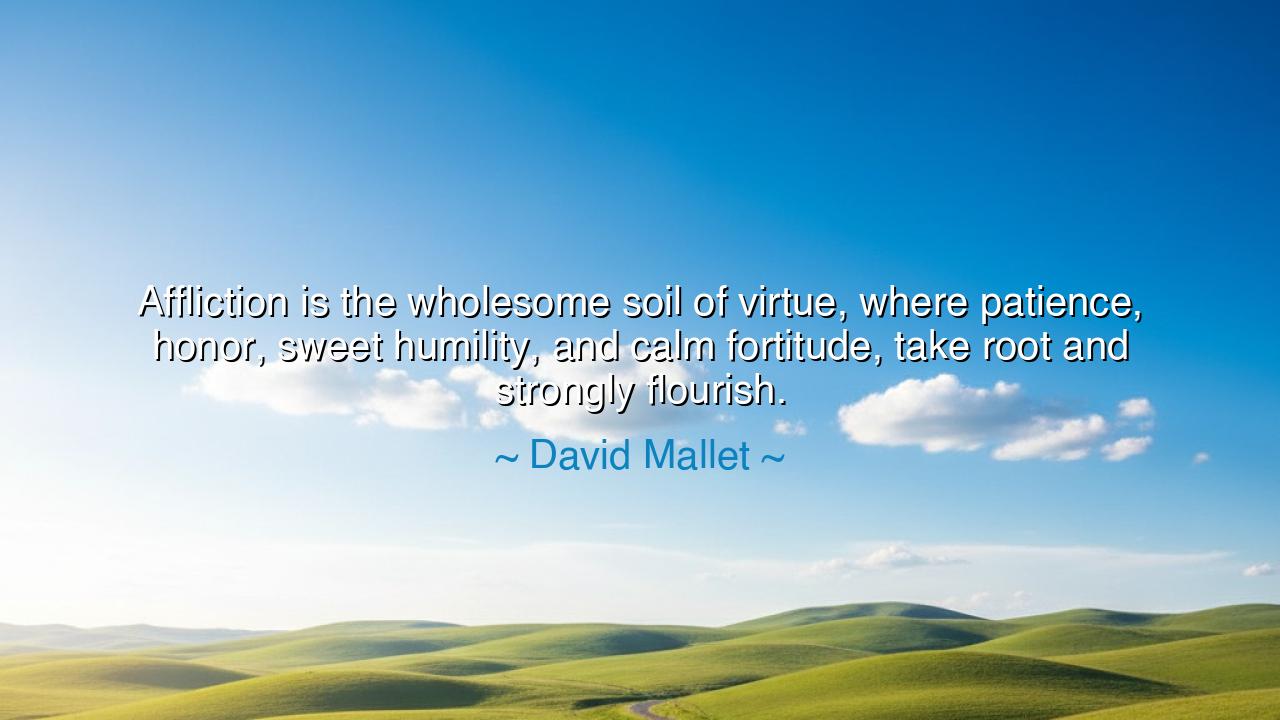
Affliction is the wholesome soil of virtue, where patience
Affliction is the wholesome soil of virtue, where patience, honor, sweet humility, and calm fortitude, take root and strongly flourish.






The words of David Mallet, poet of the eighteenth century, resound with the wisdom of ages: “Affliction is the wholesome soil of virtue, where patience, honor, sweet humility, and calm fortitude, take root and strongly flourish.” In this teaching, he unveils the paradox of human existence — that suffering, though bitter to endure, becomes the very ground upon which the noblest qualities of the soul grow strong. Just as the tree thrusts its roots deep into the soil that resists it, so too does the human spirit grow mighty when pressed by the weight of affliction.
The meaning begins with the image of soil, a metaphor as old as agriculture itself. Soil is not soft air nor open sky, but earth dense with resistance. Seeds must struggle through its heaviness to sprout, and yet it is this very resistance that nourishes them. In the same way, virtue cannot be born in ease or luxury. It is in hardship that patience is tested, that honor is proved, that humility is embraced, and that fortitude — the quiet strength to endure — reveals its power. Ease breeds weakness, but adversity breeds greatness.
Mallet himself, writing in an age of upheaval and political strife, knew that affliction was not merely a private matter but a public one. Nations, like individuals, are refined by trial. He wrote in the tradition of poets and philosophers who saw that pain and struggle, though unwelcome, are often the furnace in which character is forged. His words remind us that to curse affliction is to curse the very means by which we become noble and enduring beings.
History offers countless confirmations of this truth. Consider Nelson Mandela, who endured twenty-seven years in prison, stripped of freedom, separated from his people. Yet it was within that long season of affliction that his patience deepened, his humility was sharpened, and his fortitude became unbreakable. When at last he emerged, it was not as a man broken by suffering, but as one purified by it, able to lead a nation toward reconciliation rather than vengeance. His life stands as a living testimony to Mallet’s words.
The Scriptures also echo this eternal wisdom. Job, covered in sores and stripped of all possessions, declared, “Though He slay me, yet will I trust Him.” Out of his affliction bloomed the flower of faith that has inspired countless generations. The Apostle Paul wrote of learning patience and endurance through trials, knowing that tribulation works perseverance, and perseverance produces character. Across the ages, the holy and the heroic alike have found that it is in the valley of suffering that the seeds of virtue are sown most deeply.
The lesson for us is both sobering and encouraging. When affliction comes — and it comes to all, whether in the form of loss, betrayal, illness, or disappointment — we may be tempted to despair or to rage against it. Yet Mallet teaches us to see beyond the pain, to recognize that within the soil of sorrow lies the possibility of growth. If we embrace hardship with courage and faith, we will find that it does not destroy us, but instead cultivates within us the eternal virtues that outlast all suffering.
Practical actions arise from this wisdom. In the face of hardship, do not flee or curse your lot, but ask what patience can be learned, what humility can be nurtured, what fortitude can be strengthened. Remember the examples of those before you, who turned their darkest nights into dawns of greatness. Hold fast to honor, even when dishonor seems easy. Trust that affliction, like soil pressed down upon a seed, is not meant to bury you, but to nourish your roots so that you may rise stronger.
Thus, let David Mallet’s words be carried forward as a torch for weary travelers: affliction is not the end, but the beginning of virtue’s flourishing. In the wholesome soil of hardship, our deepest roots are planted, and from those roots spring the noblest fruits of the human soul. Embrace this truth, and you shall find that even in sorrow, life is preparing you for greatness.






AAdministratorAdministrator
Welcome, honored guests. Please leave a comment, we will respond soon